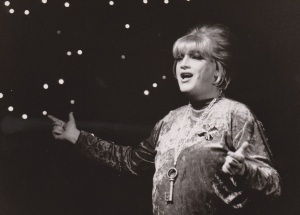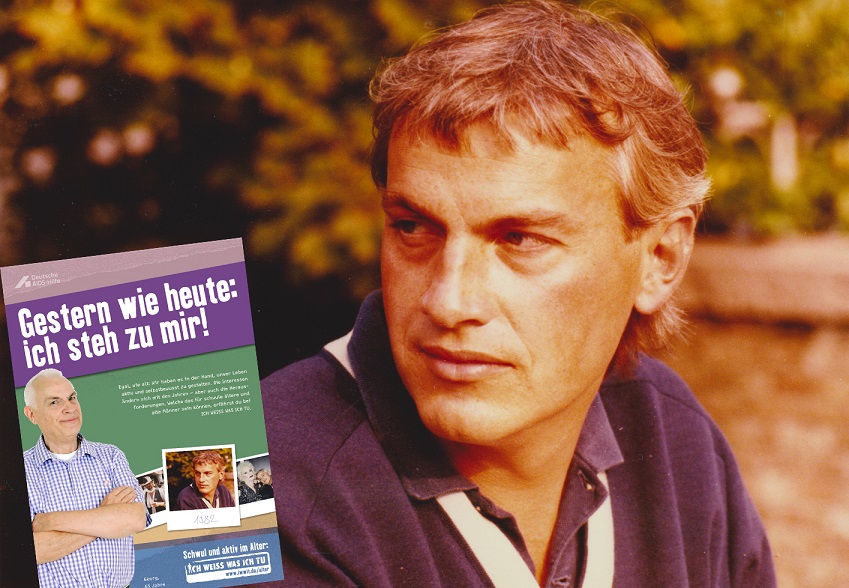Georg Roth has been politically active since his student days and helped shape the gay movement of the 70s and 80s, among other things. A lot has changed since then, but things have certainly not calmed down for the 66-year-old. Today, he is intensively involved in the interests of older gays and lesbians. He is convinced: "My generation, the Stonewall generation, will completely redefine age once again."
When Georg Roth talks about his life, his eyes light up. It quickly becomes clear why the man from Cologne has felt at home on the "gay and lesbian carousel", as he calls it, for so long. But even if Georg seems today as if his gay life has always been a matter of course, he too first had to fight his way free from the moral constraints of the post-war period. Growing up in simple circumstances in the North Rhine-Westphalian provinces, it initially felt a little strange for the then pubescent when he realised in the mid-1960s: I'm gay.
"At some point I did have a few contacts in the neighbourhood, but I never thought about coming out, apart from the fact that the term didn't even exist back then," recalls Georg, who decided to do an apprenticeship after school that would guarantee him a secure career as a civil servant. Gay in the workplace? Unthinkable, if only because of Paragraph 175, which criminalised men who love men for a long time.
"I hid, because as a potential offender I couldn't have become a civil servant, of course." At that time, Georg's life had little to do with the socially vigilant and committed activist that many in the community know and value him as.

"We all just didn't want to be as staid and conformist as the others."
However, when Georg decided one day to catch up on his A-levels and enrol at university, everything suddenly changed: "That's when I experienced my own personal gay emancipation." And step by step, this also turned into a public rebellion - against the Vietnam War and against the moral values that still clearly resonated from the Nazi era. Of course, this also included the fight for same-sex love. "From this point onwards, withdrawing into my private life was no longer an option for me; I wanted to make my sexuality public from then on," says Georg, explaining the start of his activism, which he continued in Cologne after graduating - and where he found an existing infrastructure of gay groups and projects. "I thought this left-wing, self-confident life was great. You had to deal with the autonomists, stink bombs were thrown, ah, we all just didn't want to be as staid and conformist as the others."
Later, in 1983, Georg co-founded the gay theatre group Traviatas, which he enriched above all with his legendary stage character "Sister Georg". With the emergence of the Aids crisis, the play "Ganz in weiß" (All in white) was created, which dealt with the new disease, sometimes seriously, sometimes humorously, which in turn also gave rise to new resentments towards gays. "There were slogans like 'This is God's just punishment' and many others. However, we were able to absorb such slogans and the sometimes harsh political climate reasonably well, although I am convinced that this was only possible because there was already a well-established structure of gay initiatives throughout Germany at the time."
"It's just nice to be active on an issue that affects me too."
However, when the roughest battles had been fought, Georg Roth had become managing director of the Cologne AIDS service organisation, the former full-blooded activist took almost 20 years off in 1993, during which he successfully toured the country with an improv theatre company. "It was nice to get away from all the AIDS and gay work and do something completely different." However, at some point, he got itchy feet again and Georg returned to his former life. And so it is that today he is not only on the board of the Federal Representation of the Interests of Gay Senior Citizens, but also works for the Cologne-based rubicon association, where he is responsible for issues such as how sensitive public organisations are to the concerns of gay and lesbian senior citizens: "For example, if a delivery service takes me from my flat in Marzahn to the gay group in Schöneberg - do they have a problem with that?" Georg would like to clarify these and similar questions for his peers, but also ensure that there will soon be even more facilities that specifically cater to LGBT clientele: "My generation, the Stonewall generation, will redefine age once again. Imagine if Rosa von Praunheim ran a retirement home, it would certainly be more garish and colourful than the usual facilities," laughs Georg and reveals: "It's just nice to be active on an issue that affects me myself.
He has also prepared well for his own ageing. The most important tool: "A colourful network of friends". Georg Roth is far from thinking about retiring, his professional life is clearly the centre of attention. "Watching TV all day or playing Sudoku? That wouldn't be for me". And so the gay and lesbian merry-go-round will continue to turn for Georg for some time to come.










